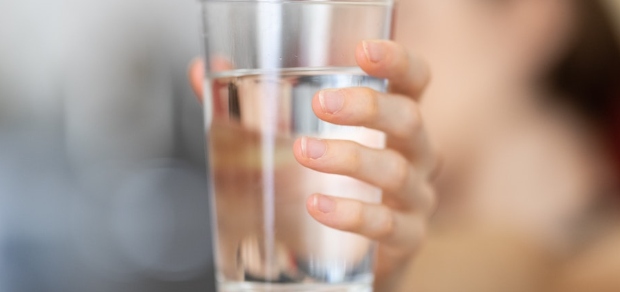
Full Bladder Keeping You Up at Night? Try This!
When you gotta go, you gotta go. But when the call of nature sounds during the night, a phenomenon known as nocturia, it may be a symptom of an overactive bladder (OAB). Other symptoms of OAB include urgency and incontinence. Anybody can be affected by OAB, but it’s often associated with menopause. According to one study, 76 percent of women over age 40 reported getting up to go to the bathroom at least once per night. This can lead to an increased risk for falls, hip fractures, even anxiety or depression.
The menopausal body goes through major hormonal changes, including a drop in estrogen levels. This is a common cause of OAB, says Brian Norouzi, M.D., a board-certified urologist at Providence St. Joseph Hospital in Orange County, California. A lack of estrogen can lead to the thinning of the lining of the urethra (the tube that empties urine from your bladder) and the weakening of the pelvic floor (the group of muscles that supports the urethra and the bladder). It’s no wonder, then, that women feel an increased need to pee during menopause.
Everybody’s menopause experience is different, but sharing those experiences can help make this life stage a little less confusing and distressing. And that goes for midnight bladder wake-up calls! Here’s advice from four women on how to deal with this frustrating aspect of midlife.
Record Your Eating and Drinking Habits
When Molly G., 47, of New York City, started going to the bathroom several times during the night, her doctor suggested she keep a written record—not just of how often she peed, but also of what she ate and drank in the hours before bedtime. “I was skeptical, but it worked,” she says. “I figured out that if I drank more than a couple of beers, or ate salty snacks, I was more likely to wake up with the urge to go.”
Norouzi confirms that nighttime urination can be managed by reducing fluids before bedtime, particularly drinks that are known to be bladder irritants, like coffee, tea, soda, and alcoholic beverages. Foods with high sodium content can have a similar effect, because your kidneys have to work overtime to get rid of the extra salt. Research from Nagasaki University in Japan found that people over age 60 who were able to reduce their salt intake from 10.7 grams per day to 8 grams per day cut their nighttime bathroom trips from an average of 2.3 times per night to 1.4 times.
Think about Your Meds
Women over 40 may be more likely to experience increased urination at night if they’re taking certain medications, including diuretics, lithium, and phenytoin, says Sherry Ross, M.D., an ob/gyn at Providence Saint John’s Health Center in Santa Monica, California.
Kay T., 52, of Atlanta, realized the diuretic water pill she was taking every evening to treat her high blood pressure was making her urinate more often through the night. “I spoke to my doctor, and she gave me the green light to take it in the morning instead,” she says. “I still get up during the night to pee sometimes—but it’s maybe one time, not three or four!”
“Looking at medication alternatives with your healthcare provider is an easy way to reduce the number of nighttime bathroom trips,” Ross says. She adds that several health conditions, including congestive heart failure, diabetes, high blood pressure, restless leg syndrome, sleep disorders, and insomnia, are also likely to cause more episodes of urinating at night.
Limit Fluids Before Bed
For Fiona P., 45, of Tampa, Florida, the answer to reducing those nocturnal bathroom visits was supersimple. “I just stopped drinking in the two hours before bedtime,” she says. “I made sure I kept my fluid levels up throughout the day—I just didn’t let anything pass my lips after 8 p.m.”
Don’t forget to stay hydrated, which is crucial for optimum physical and mental health. The U.S. National Academies of Sciences, Engineering, and Medicine has determined that an adequate daily fluid intake for women is about 11.5 cups (2.7 liters) per day.
Put Your Feet Up
As well as experiencing an increased need to urinate during the night, Maria L., 46, of Orange County, California, noticed that her early 40s gave her the gift of swollen legs and feet. “On the advice of my doctor, I started exercising more often—walking and swimming are my thing,” she says. “But I also spend plenty of time with my feet elevated in the late afternoon and evening. It stops me from peeing so much overnight.”
This is because fluid that can gather in the legs and feet during the day (known as edema) gets reabsorbed into your system when you lie down to go to sleep. When it heads to your kidneys to be processed, you’ll wake up to go to the bathroom. Wearing support hose during the day can also help reduce swelling in the extremities (and encourage daytime urination).
Waking up several times during the night to go to the bathroom can be really disruptive. Not only is it annoying, but persistent sleep disturbances may also lead to other problems, including irritability, fatigue, anxiety, depression, trouble focusing and paying attention, and challenges at work and school. If you’re struggling to deal with any of these symptoms, and these lifestyle modifications do not work, check in with your healthcare provider.
You May Also Like:
- 7 Tips for Better Sleep in Midlife
- 7 Menopause Symptoms Caused by Your Changing Hormones
- How to Truly Rest Your Body, Mind, and Spirit
Want to Read More?
Access all of Twill Care’s content, community, and experts for free!
Already a member? Login
Want to Read More?
Access all of Twill Care’s content, community, and experts for free!
sign UP For FreeAlready a member? Login

